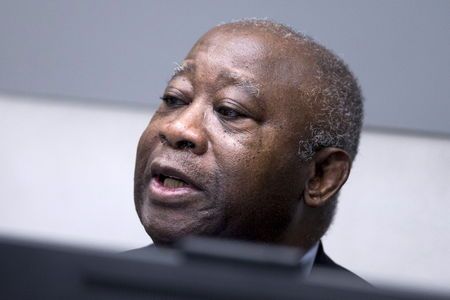Former president Laurent Gbagbo returns to Ivory Coast on Thursday for the first time in nearly a decade, after he was cleared of crimes against humanity and his once-bitter rival welcomed him back in the name of reconciliation.
Gbagbo left the country in humiliation in 2011, after his refusal to accept electoral defeat sparked a conflict that ended in his arrest and transfer to The Hague.
- EFCC boss: Minister who bought $37.5 million property not in Buhari’s govt
- Lagos police arrest 127 suspects for traffic robbery
The 76-year-old’s homecoming will be a key test of stability in Ivory Coast, the world’s biggest cocoa producer and the wealthiest country in francophone West Africa.
Gbagbo boarded a commercial flight to Abidjan from Brussels on Thursday morning, his spokesman Justin Katinan Kone told AFP.
The Belgian capital has been his home since the International Criminal Court (ICC) acquitted him in a shock decision in 2019. An appeal against the ruling failed in March, paving the way for his return.
Gbagbo was ousted in April 2011 after around 3,000 people died in the months-long conflict that followed his refusal to accept electoral defeat at the hands of Alassane Ouattara, the current president.
Police disperse supporters
Today, Gbagbo has been recast in the role of statesman, called upon to help national reconciliation after elections last year left scores dead.
Ouattara, 79, has facilitated his return, issuing his rival with a diplomatic passport and promising him the rewards and status due to ex-presidents.
Ouattara is letting Gbagbo use the presidential salon at Abidjan airport upon arrival, and tents will be set up for dozens of notables to hail his return.
He will then travel through the city to the Attoban neighbourhood, where his old campaign headquarters are located, according to a statement from his Ivorian Popular Front (FPI) party.
The party held talks about the scale of the celebrations with the government, which preferred a more discrete event.
Communications Minister Amadou Coulibaly said Wednesday that gatherings by Gbagbo’s supporters had been authorised. “If there was any ban, it would have been made public,” he said.
Young people carrying the national flag were seen walking on the road towards the Abidjan airport early Thursday, many from a poor district of the city.
“We’re ready,” a woman said, wearing a T-shirt with Gbagbo’s face on it.
“We want to see him to believe it,” said another supporter, wearing a shirt that read “Gbagbo acquitted, thank you, Lord.”
However the road to the airport was blocked to the public, and later Thursday police used tear gas to disperse dozens of angry Gbagbo supporters gathered along it, according to AFP reporters.
Gbagbo spokesman Kone said “we are surprised by this unjustified reaction”.
He added that “arrests have been carried out” and that buses of Gbagbo supporters coming in from the provinces had been blocked from entering Abidjan.
“This is out of step with the spirit” of cooperation between the government and FPI “which had prevailed until now,” he added.
After leaving the airport, Gbagbo’s motorcade is scheduled to pass through several areas where crowds of supporters are expected to gather to cheer him on.
‘Wounds are still open’
But not everyone is overjoyed at his return.
Groups representing the victims of the 2010-2011 post-election violence have condemned the “impunity” he has received and say they plan to protest in Abidjan.
They also point to a 20-year jail sentence Gbagbo was given in absentia for “looting” the Central Bank of West African States during the conflict.
Authorities have already hinted that this sentence will be lifted.
First elected in 2000, Gbagbo’s tenure was marked by division and rebellion in the former French colony nation once seen as a beacon of stability in West Africa.
Elections that should have been held in 2005 were postponed six times until 2010, when he lost to Ouattara. Conflict erupted, leading to his arrest in April 2011 and transfer to the ICC in November that year.
His party insists he is returning in peace. In March, it took part in legislative elections, ending a decade-long boycott of the ballot box.
“The wounds are still open… and the authorities are worried that Gbagbo will stir up the crowds again, which is one of his hallmarks,” said Rinaldo Depagne, a researcher at the International Crisis Group think tank.
But attention has also turned to a rising Islamist threat after jihadists killed four soldiers near the border with Burkina Faso.
“Above all else, we must form a sacred union” to unite “our efforts to confront the terrorists,” prominent pro-Ouattara writer Venance Konan said in a newspaper editorial this week.

 Join Daily Trust WhatsApp Community For Quick Access To News and Happenings Around You.
Join Daily Trust WhatsApp Community For Quick Access To News and Happenings Around You.


